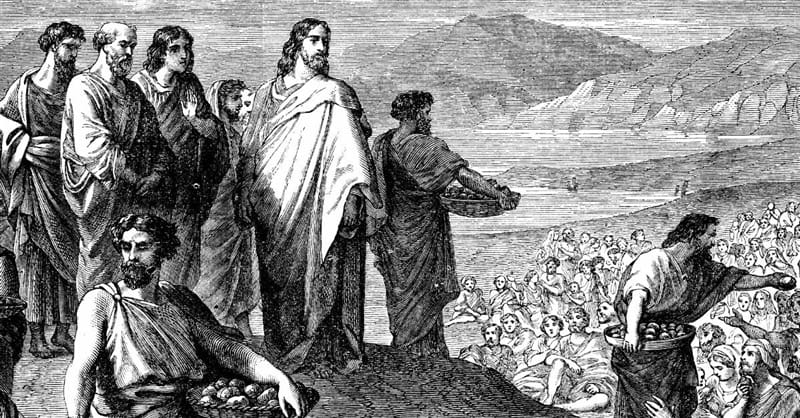
“…he saw a great crowd; and he had
compassion for them and cured their sick.” (Matthew
14:14)
It seems that every time we look at a
familiar story in the Bible it tends to morph into something new. The last time
the story of the feeding of the 5000 in Matthew’s gospel (Matthew 14:13-21)
rolled around in the Revised Common Lectionary, I was really struck by the fact
that Jesus gave himself to the care of the crowd even though he’d just learned
that his cousin and mentor, John the Baptist, had had his head sliced off by
Herod Antipas.
Verse 13 tells us: “Now when Jesus heard
this, he withdrew from there in a boat to a deserted place by himself.” Can you
blame the guy..? Jesus was probably grieving for his cousin and needed some
alone time, or he was making a strategic withdrawal before Herod got any ideas
about coming after him. Whatever his
motivation to scram out of Dodge might’ve been, Jesus was still willing to give
up his time and be compassionate to the people when they needed him. This is kind of a pre-Calvary example of Jesus' willingness to sacrifice.
When I look at this story again today, I’m asking: What's up with Jesus? What's he DOING here? If you look a few paragraphs earlier,
before all the John the Baptist stuff that starts chapter 14, you’ll see one of
Jesus’ great teaching discourses about the Kingdom of Heaven (That was the
gospel lesson for last week in the RCL). If you were to remove the detour about
John, the Jesus narrative shows him as teacher, healer, and provider of food.
So what I pick up on is Jesus’ compassion and desire to see the sick be healthy
is more important than his need for privacy. Then he tells the disciples (who
really do seem concerned that the crowd gets something to eat) to feed the
folks out of their own supply and not make those five thousand fend for
themselves.
What is Jesus providing? Education,
healthcare, and nutrition. Out of compassion.
“Jesus said to them, ‘They need not go
away; you give them something to eat.” (v.16)
I suspect there may be a lot of
well-meaning American Christians who are perfectly delighted to see Jesus
dispense education, healthcare, and nutrition, but they just don’t want to see
the federal government doing it. I write this post as we’ve been listening to
weeks of debate from our leaders in Washington, D.C. about the merits of
affordable healthcare, public education, and entitlement programs. But I notice
that Jesus doesn’t stop and ask the sick if they can afford a premium or if
they have a pre-existing condition. Neither does he blame the multitude for
coming out to meet him without bringing their picnic baskets. He doesn’t send
the poor away empty. He tells his disciples to feed them.
My take-away from this is that Jesus wants
us to be educated, healthy, and fed. When the resources exist to care for a
population, that population deserves to enjoy them. The story of the feeding of
the 5000 also impresses me with the miracle of God’s providence. We may think
we don’t have enough to share, but God uses what we have and shows us it’s
always more than enough. And Jesus puts the responsibility on us—his disciples—to
see that all are served.
It would be pretty swell (wouldn't it?) if we the people could create a society in which all needs were met and in which people were educated, cared for, and fed as a right not as a privilege. But, as our government seems pretty deadlocked as to how to go about this (or even if they want to attempt it), the burden falls back on us Christians to do the work of Jesus.
He was willing to sacrifice himself for the sake of others. Are we?
It would be pretty swell (wouldn't it?) if we the people could create a society in which all needs were met and in which people were educated, cared for, and fed as a right not as a privilege. But, as our government seems pretty deadlocked as to how to go about this (or even if they want to attempt it), the burden falls back on us Christians to do the work of Jesus.
He was willing to sacrifice himself for the sake of others. Are we?
No comments:
Post a Comment